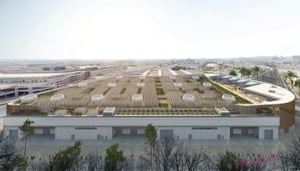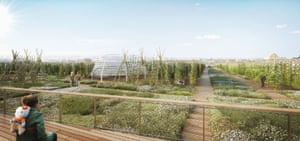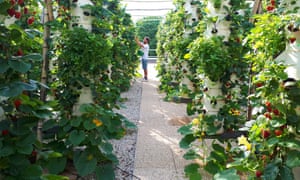World's largest urban farm to open – on a Paris rooftop
The 14,000m² farm is set to open in the south-west of Paris early next year

The new rooftop farm in Paris will be the largest of its kind in the world.
Photograph: Valode & Pistre Architectes Atlav AJN
It’s a warm afternoon in late spring and before us rows of strawberry plants rustle in the breeze as the scent of fragrant herbs wafts across the air. Nearby, a bee buzzes lazily past. Contrary to appearances, however, we are not in an idyllic corner of the countryside but standing on the top of a six-storey building in the heart of the French capital.
Welcome to the future of farming in Paris – where a whole host of rooftop plantations, such as this one on the edge of the Marais, have been springing up of late. Yet this thriving operation is just a drop in the ocean compared to its new sister site. When that one opens, in the spring of 2020, it will be the largest rooftop farm in the world.
Currently under construction in the south-west of the city, this urban oasis will span approximately 14,000 sq metres (150695 sq feet) – also making it the largest urban farm in Europe. With the plan to grow more than 30 different plant species, the site will produce around 1,000kg of fruit and vegetables every day in high season. Tended by around 20 gardeners, they will also be using entirely organic methods.

The aim is for the farm to be a global model for sustainability. Photograph: Valode & Pistre Architectes Atlav AJN
“The goal is to make the farm a globally-recognised model for sustainable production,” says Pascal Hardy, founder of Agripolis, the urban-farming company at the centre of the project. “We’ll be using quality products, grown in rhythm with nature’s cycles, all in the heart of Paris.”
Located on the top of a major exhibition complex currently under redevelopment in the 15th arrondissement, the Paris Expo Porte de Versailles, the farm will also have its own on-site restaurant and bar with capacity for around 300 people. Run by Paris’s renowned chain of rooftop venues, Le Perchoir, this aerial eatery will offer panoramic views over the capital – and, needless to say, the menu will feature seasonal produce grown on the site.
The Cityscape: get the best of Guardian Cities delivered to you every week, with just-released data, features and on-the-ground reports from all over the world
“Our fresh produce will be used to feed the inhabitants across the south-west of the city – either directly, through veg-box schemes or via shops, hotels and canteens – thereby helping to reduce food miles,” Hardy says. “Furthermore, we won’t be using any pesticides or chemicals, so the farm will be a haven for biodiversity.”
The farm will also offer a range of services related to urban agriculture, including educational tours, team-building workshops and special events. Last but not least, there will be the opportunity for local residents to lease small vegetable plots of their own – in specially-devised wooden crates – helping to reconnect city-dwellers with their food source.

Local residents will also have an opportunity to lease small plots of their own. Photograph: Valode & Pistre Architectes Atlav AJN
“Our guiding principle with all our farms is to help foster environmental and economic resilience in tomorrow’s cities,” says Hardy, who expects the farm to start making a profit within its first year. “If we can create a model that is commercially viable, rather than having to rely on goodwill and subsidies, that will help urban farms to become sustainable in their own right.”
While large-scale urban farming is nothing new in itself, with major sites in The Hague, Detroit and Shanghai, among others, this new flagship farm in Paris will be ground-breaking in several ways. Not only will it be the largest rooftop farm in the world but they will also be pioneering their own technique in aeroponic ‘vertical’ farming.
Apart from not requiring pesticides, this method uses a closed water system and no soil – therefore minimising the risk of any pollutants. Furthermore, by supplying people right on the doorstep, the farm will have an exceptionally low carbon footprint.

Strawberries growing at one of the other rooftop farms in Paris run by Agripolis. Photograph: Agripolis
“Our vision is a city in which flat roofs and abandoned surfaces are covered with these new growing systems,” says Hardy. “Each will contribute directly to feeding urban residents who today represent the bulk of the world’s population.”
For now at least, urban farming seems to be thriving here in all its forms. In fact, the City of Paris has committed to planting 100 hectares of vegetation across the capital by 2020, through its Parisculteurs project, with one third of this devoted to urban agriculture. For example, new for this year, a farming promenade is set to be created beneath the aerial métro line at Barbès.
Among the other imaginative agricultural sites across the city is the eco-farm of La Recyclerie, installed along the old railway line at Porte de Clignancourt, and the organic mushroom operation, La Caverne, located in an underground car park at Porte de La Chapelle. Even the capital’s much-maligned Montparnasse Tower is rumoured to be getting its own growing space.
Follow Guardian Cities on Twitter, Facebook and Instagram to join the discussion, catch up on our best stories or sign up for our weekly newsletter
As the crisis escalates…
… in our natural world, we refuse to turn away from the climate catastrophe and species extinction. For The Guardian, reporting on the environment is a priority. We give reporting on climate, nature and pollution the prominence it deserves, stories which often go unreported by others in the media. At this pivotal time for our species and our planet, we are determined to inform readers about threats, consequences and solutions based on scientific facts, not political prejudice or business interests.
More people are reading and supporting The Guardian’s independent, investigative journalism than ever before. And unlike many news organisations, we have chosen an approach that allows us to keep our journalism accessible to all, regardless of where they live or what they can afford. But we need your ongoing support to keep working as we do.
The Guardian will engage with the most critical issues of our time – from the escalating climate catastrophe to widespread inequality to the influence of big tech on our lives. At a time when factual information is a necessity, we believe that each of us, around the world, deserves access to accurate reporting with integrity at its heart.
Our editorial independence means we set our own agenda and voice our own opinions. Guardian journalism is free from commercial and political bias and not influenced by billionaire owners or shareholders. This means we can give a voice to those less heard, explore where others turn away, and rigorously challenge those in power.
We need your support to keep delivering quality journalism, to maintain our openness and to protect our precious independence. Every reader contribution, big or small, is so valuable. Support The Guardian from as little as $1 – and it only takes a minute. Thank you.

Recent Comments